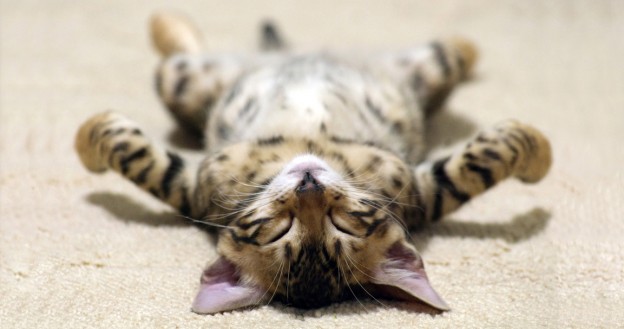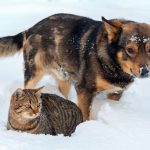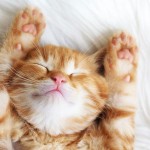Last updated: December 6th, 2018
Sleep, Play, Sleep, Eat, Groom, Sleep, Go Crazy, Eat, Groom, Sleep.
This is how a typical cat usually spends their day, but why do they spend so much of their time sleeping?
An adult cat will typically sleep for between 16 and 20 hours a day, with very young and old cats being at the upper end of that scale. Newborns will sleep for almost 24 hours a day, 7 days a week. With this amount of shut-eye, you won’t be surprised to learn that cats are one of the top sleepers in the animal kingdom.
Indoor cats also tend to sleep more than cats that are allowed outside, and the weather plays a part too – if it’s a cold, dreary and wet outside, cats will tend to sleep for longer.
Bored cats also sleep more, so help your cat stay active by playing with them, and leaving out interactive cat toys for them to play with when you are out.
Resting and Hunting
The reason for this is simple; in the wild, cats of all sizes need to hunt to catch prey in order for them to eat. Cats are not scavengers, so they require freshly caught food to eat. Stalking and then pouncing on prey – whether it is a mouse or a catnip toy – requires a huge burst of energy, and the only way to build up that energy is for a cat to sleep or snooze for a large proportion of the day. By sleeping for so long, they save energy to catch their next meal.
Once a cat has caught and eaten their meal, they will usually groom themselves before settling down for a snooze. This is to remove any traces of the prey from their fur, to avoid alerting other predators nearby.
You might wonder why your cat needs to build up that energy to hunt when you provide them with regular meals that don’t need to be chased. This is because their natural instincts haven’t changed – domestic cats still have the same genetic programming (and thus primal instincts) as those in the wild.
The Catnap
Cat sleep however is not the same as our sleep. Cats tend to doze (catnap) then have short periods of deep sleep known as Rapid Eye Movement (REM) sleep before going back to dozing. Around 3/4 of a cat’s sleeping pattern is dozing, so they may doze for 15 minutes, then deep sleep for 5 minutes.
While dozing, they are alert and can awaken at a moments notice, and be ready for action almost immediately. You can tell when a cat is in this dozing phase as their ears twitch and rotate towards any sounds, and their eyes open a tiny bit. They can even doze while sitting up!
During the deep sleep phase, they will tend to curl up with their eyes tightly closed – sometimes with their tail or a paw over their face like a sleeping mask. Cats can dream too in this deep sleep – if their paw or whiskers twitch it’s likely that they are dreaming. No one knows what they dream of, but it’s likely that birds and mice feature strongly!
Crazy Cats
For creatures who like to sleep so much, it’s always puzzling why they insist on waking up at 4am and running around like crazy! The reason for this is again due to their instincts. Cats are what is known as crepuscular, which means they are most active during the twilight hours of dawn and dusk. So while most humans are fast asleep at 4am, your cat’s internal clock is telling them it is time to get up and hunt for their next meal.
Cats are also sociable and adaptable creatures, so they can adjust their sleeping habits so that they spend more time with their loved ones – that’s you! They will also adapt their sleeping patterns around meal times.
Changes in Sleeping Patterns
If you notice any changes in your cat’s sleeping pattern, you may want to speak to your vet. More or less than usual sleeping amounts could be due to medical problems, such as hyperthyroidism. Lethargy can also be a sign of illness in your pet.
Overweight cats can lack energy and slow down, which then results in additional weight gain. If you think your cat is overweight, then speak to your vet for advice on diet, and try to ensure your cat gets more exercise, for example by playing with them more frequently.
Cat Sleeping Facts
In the wild, female lions sleep for longer than males, as they do most of the hunting.
Cats can snore too – usually this is caused by extra skin from the soft palate, and is most likely to occur in short-nosed breeds with squashed-looking faces such as the Persian. Overweight cats are also more likely to snore.




